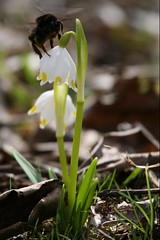 |
| Rudbekia:Brockvicky |
 |
| Penstemon: M Martin Vicente |
 |
| water mint: Tico |
One of the volunteers brought in some water mint which we planted on the edge. Apart from being very atttractive with clusters of pink, blue or lilac coloured flowers at the tip of square shaped stems, water mint smells wonderful and attracts butterflies such as the small tortoiseshell and peacock so hopefully we'll be seeing those in the summer. And you can make mint tea from the leaves - though I've never tried it.
So, altogether a very satisfying day!
If you're interested in joining us at the farm. Come along any Tuesday after 10.00 for a chat or email dave_meara@hotmail.com
If you've got any thoughts on this or anything else to do with the urban farm just leave a comment in the box.






